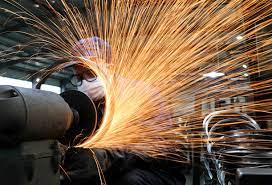
According to a business survey released on Wednesday, China's manufacturing activity slid back into recession in November due to weak demand, declining employment, and rising costs.
In November, the Caixin/Markit Manufacturing Purchasing Managers' Index (PMI) dropped to 49.9 from 50.6 the month before, falling short of expert forecasts of 50.5 according to a Reuters’ survey. On a monthly basis, the 50-mark distinguishes between growth and contraction.
The second largest economy of the world has lost steam since the second half of last year, as it grapples with a sluggish manufacturing sector, debt issues in the housing market, and fresh and repeated Covid-19 outbreaks.
Analysts predict the decline in GDP witnessed in the third quarter to continue into the fourth quarter as well, with demand expected to be weak due to the worldwide Covid-19 pandemic's persistence.
The results of the private poll, which focused on small businesses in coastal areas, contrasted with those of an official survey released on Tuesday, which showed industrial activity increased for the first time in three months.
"Supply in the manufacturing sector recovered, while demand weakened. Relaxing constraints on the supply side, especially the easing of the power crunch, quickened the pace of production recovery," said Wang Zhe, senior economist at Caixin Insight Group, in a statement accompanying the data release.
"But demand was relatively weak, suppressed by the COVID-19 epidemic and rising product prices."
According to the Caixin survey, production increased for the first time in four months in November, but new orders fell back into contraction. Employment declines have also worsened.
After months of persistent build-up, cost pressures are now subsiding with government’s attempts to rein in record-high raw material prices have paid off.
Input price inflation has slowed, with a sub-index for input costs falling to 52.3 from 65.1 the previous month.
Steel prices dropped dramatically in November, but chemicals and electronics costs remained high, according to the poll.
Caixin Insight Group's Wang recommended authorities to focus on assisting small businesses and pay attention to issues including as declining employment, restricted family income growth, and poor consumer spending power.
"In addition, the prices of some raw materials remained high. Enterprises are still facing high cost pressures. Policymakers should treat inflation seriously.
(Source:www.latestly.com)
In November, the Caixin/Markit Manufacturing Purchasing Managers' Index (PMI) dropped to 49.9 from 50.6 the month before, falling short of expert forecasts of 50.5 according to a Reuters’ survey. On a monthly basis, the 50-mark distinguishes between growth and contraction.
The second largest economy of the world has lost steam since the second half of last year, as it grapples with a sluggish manufacturing sector, debt issues in the housing market, and fresh and repeated Covid-19 outbreaks.
Analysts predict the decline in GDP witnessed in the third quarter to continue into the fourth quarter as well, with demand expected to be weak due to the worldwide Covid-19 pandemic's persistence.
The results of the private poll, which focused on small businesses in coastal areas, contrasted with those of an official survey released on Tuesday, which showed industrial activity increased for the first time in three months.
"Supply in the manufacturing sector recovered, while demand weakened. Relaxing constraints on the supply side, especially the easing of the power crunch, quickened the pace of production recovery," said Wang Zhe, senior economist at Caixin Insight Group, in a statement accompanying the data release.
"But demand was relatively weak, suppressed by the COVID-19 epidemic and rising product prices."
According to the Caixin survey, production increased for the first time in four months in November, but new orders fell back into contraction. Employment declines have also worsened.
After months of persistent build-up, cost pressures are now subsiding with government’s attempts to rein in record-high raw material prices have paid off.
Input price inflation has slowed, with a sub-index for input costs falling to 52.3 from 65.1 the previous month.
Steel prices dropped dramatically in November, but chemicals and electronics costs remained high, according to the poll.
Caixin Insight Group's Wang recommended authorities to focus on assisting small businesses and pay attention to issues including as declining employment, restricted family income growth, and poor consumer spending power.
"In addition, the prices of some raw materials remained high. Enterprises are still facing high cost pressures. Policymakers should treat inflation seriously.
(Source:www.latestly.com)














